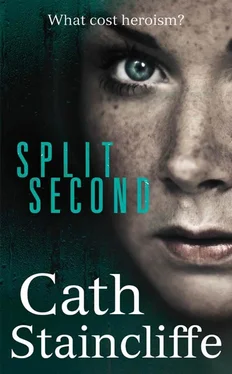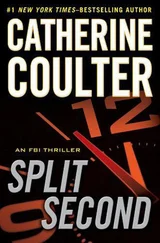‘You want us just to be friends?’
Did she even want that? ‘Yeah,’ she answered. Though she couldn’t really imagine it.
That tightness in his jaw again, then he cleared his throat. ‘Very well,’ he said, stiffly, formality his way of coping.
‘Please take these.’ She pushed the bottle and the cigarettes his way.
‘No, they are yours,’ he objected, getting up.
She stood too, awkward now, not knowing whether to approach him, to thank him. A farewell hug. He made no move, and she took her cue from him.
She was relieved when he had gone. She’d always known that she and Carl were a time-limited affair. Had realized that it would not lead to them moving in together or, God forbid, babies. She thought he had too, but perhaps he’d harboured hopes for more.
There had never been that wild, desperate attraction she’d felt for Roland, and later for Eddie. She’d been misguided with Roland, but she’d have married him in the blink of an eye if he’d asked. And with Eddie it was pure joy, as the dizzy, chaotic sensations of being in love settled into a deep love and respect, a delight at being together. She wondered if Roland had married his African fiancée, and if he’d stayed true. Perhaps he had taken other wives, as was legal in his part of the world.
Would it have made any difference to how Luke had turned out if he had known his father? Would letters or a clutch of meetings have been enough to temper his alienation from school, his waywardness? Occasionally Louise had Googled Roland’s name, but she never found any reference to him. She had asked Luke directly when he was twelve or so, ‘Would you like to try and find your dad, make contact?’
‘No,’ he’d replied, his lip twisting with derision. ‘What for?’
Her attempt to prolong the discussion had led to him walking out of the house.
Had Roland ever given a second thought to the child he’d left in Manchester? He knew she’d been pregnant, but had already left when Luke was born. He never knew whether he had a son or a daughter, or even twins. She found it hard to conceive of that level of indifference. And given how he had treated her, at the end of the day perhaps it wasn’t unreasonable to assume that Roland in Luke’s life might have made things worse, not better.
She picked up one of the packets of cigarettes. It was only half nine; Angie would still be up.
‘I’m just popping next door,’ she called up to Ruby.
‘’Kay.’
Louise looked at the vodka, then changed her mind. She’d regret it tomorrow if she started on that. Another time, she promised herself.
Andrew
The first day back was the worst. It was like an obstacle course, with each encounter a negotiation of sympathy and reassurance, a battery of questions or an exchange of platitudes. Andrew spent much of the time clamping down on his emotions, on his empathy: setting his teeth against colleagues with teary eyes or faces stark with embarrassment; tensing his muscles against pats and strokes and even hugs.
The clients, most of whom didn’t know him from Adam, and hadn’t made the connection between him and the city’s latest tragic murder, came as a blessed relief. With them he could immerse himself in the business of work. The woman who had had a stroke, the post-op cancer patient and the car-crash survivor: he was there to help while they were the victims of misfortune, lives suddenly altered beyond recognition, changing course, tacking out into the unknown. With him they could regain the use of muscles, tongue and teeth, remaster breathing and vocalization, practise the mechanics of talking, learn to speak again. With each patient he would assess where function had been lost or compromised and create individual treatment plans including exercises to be done at home, or in hospital, between his sessions. He liaised with medical and physio staff too around issues of diet (those whose condition left them at risk of choking), emotional and psychological barriers to compliance and the impact of medication on recovery.
At lunch he steered clear of the canteen, avoiding the risk of running into more well-wishers; bought a sandwich and a drink from the machines instead and ate it in his car. He rang Val to see how she was faring, and they compared notes.
‘I’ve decamped to one of the meetings rooms,’ she said.
‘And I’m hiding in the car.’
‘I might be late,’ she said.
‘That’s not like you,’ he teased her.
‘Someone’s cocked up the environmental health training report. I need to rescue it before it gets sent out.’
‘Can’t get the staff.’
She gave a little laugh. ‘See you later.’
‘Yeah, bye.’
He sipped his coffee and watched the parade of cars prowling around hunting for a parking space. It cost him an arm and a leg to leave the car, and though he might be able to cycle the five miles to work, the prospect of cycling back at the end of the day kicked that idea into touch. One car paused to the back and side of his, its owner making motions with his hands, translating as: You coming out?
Andrew shook his head, mouthed: Sorry. Sat there until his break was over.
* * *
His final patient that afternoon was a young man, early twenties, whose long-term abuse of solvents had left him with damage to the throat and vocal cords. Andrew read his notes carefully and made his own examination: feeling the patient’s throat and neck and jaw, looking inside his mouth, where he saw the scar tissue on the lining of the mouth and throat, and also the badly decayed teeth, the enamel now translucent, grey, the dentine destroyed.
‘You getting any rehab?’ he asked.
The man shook his head. The skin around his mouth was crusted with a virulent rash.
‘Are you on the waiting list?’ Andrew asked him.
He nodded.
‘Because any more abuse like this and your cords’ll pack up for good, yeah?’
The patient shrugged, and Andrew felt a flash of anger. This lad destroying his health, mistreating his own body, no idea how precious life was. He turned away, pretending to study his notes, waiting for the fierce emotion to ebb away and rational thought to return. As in – maybe he doesn’t see his life as precious: low self-esteem, shitty background, his life a burden half the time, something he only wants to escape from.
‘Put your lips together,’ Andrew said. ‘Good. Now open them, not too wide, right. Sit up straight. Now, do that again, but first take a breath down here,’ he indicated on himself, below the diaphragm, ‘and as you open your mouth, push the air out, like so: “Pah! Pah!”’ The man copied him, then grinned sheepishly. ‘What we’ll do,’ Andrew said, ‘is build up a way of speaking that minimizes the strain on your vocal cords. A lot of it is about relaxation.’
At the end of their fifteen minutes, he sent the man away with a copy of exercises he had to do, with no idea whether he’d be back at the same time the following week or if that was the last he’d see of him.
He caught up with his emails, and the online newsletters he subscribed to for work. There was a piece inviting papers on selective mutism. People, usually children, who stopped speaking, or never started, not because of any physical impediment but due to psychological factors, in particular acute social anxiety or phobia. Most children eventually developed coping mechanisms and so learned to communicate in public. Because Andrew dealt with adults, he’d never worked with a patient like that, though in his training he had shadowed a therapist treating a four-year-old girl who had become mute once she started school. The name for the disorder had changed in recent years, from elective mutism to selective. Reflecting the understanding that people suffering from the condition did not choose to stay silent but were physiologically unable to speak in certain situations.
Читать дальше












